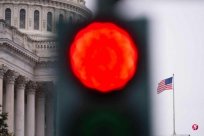Source: Bloomberg
U.S. Treasury Minister Yellen warned Chinese leaders saying that China's manufacturing production threatened the global economic stability.Next week, Washington will have the opportunity to unite more countries.
Yellen, who has just returned from Beijing to the International Monetary Fund (IMF) and the Spring Conference of the World Bank. At that time, the United States will welcome the Treasury Minister and the Governor of the Central Bank from all over the world, including the Seventh Kingdom Group and the 20th Group.Financial officials.
In view of the dominant position of the United States in all these forums, it is expected that the United States will try to express concerns about China ’s output and exports with other countries in Europe, Asia and Latin America.
"Yellen shows that this is a problem that the United States is paying attention to, which is telling China that there will be something that happened next." For example, trade restrictions, and the US Foreign Relations Commission Trade Policy Researcher Inu Manak said."If this question is not mentioned again next week, I will be surprised."
A U.S. official who requested anonymous because of the discussion of internal review said that the problem of overcapacity is the concerns of many major trading partners in China. The department is expected to discuss this issue next week.
Since joining the World Trade Organization (WTO) 20 years ago, China ’s support for domestic industries has led to complaints from competitors.They believe that the direct and indirect support of the Chinese government has lowered costs and reduced export prices.
But the superposition of various factors has increased the bets of Washington and its partners, including China's dominance in the field of electric vehicles and battery, and US President Biden promoted the electric vehicle manufacturing industry in the election year.
IMF predicts that the Chinese economy will grow by 4.1%next year, only half of the average level of the first ten years of the crown disease, because the Chinese economy is affected by the downturn, shrinking pressure and decline in consumer confidence in the real estate industry.In the case of such weak domestic demand, the United States is worried that just like the previous solar panels and steel industries, the United States and European markets will pour a large number of Chinese electric vehicles.
"The government's support has led to the current production capacity that greatly exceeds the domestic demand and the level that the global market can withstand," Yellen said at the event hosted by the American Chamber of Commerce in China on April 5."This may weaken the business of American companies and workers, and the business of companies around the world including India and Mexico."
The Seventh -way Group Allies, including Canada, France, and Germany, also expressed concern about China's exports.Brazilian President Lula expressed his concerns, and recently launched a series of surveys on suspected dumping of industrial products such as steel.
IMF President Georkiyeva said on Thursday that she has been communicating with Chinese officials on the road of China's economic development, including encouraging domestic demand.She said that for industries facing excess capacity, the "key" is to "turn more economic to the service industry so that this problem will not continue."
The United States has hinted that in the study of the study of tariffs on Chinese electric vehicles, the European Union entered an additional tariffs on Chinese -produced electric vehicles that entered the EU last month.
Biden has a strong political reasons for China in China.Donald Trump, a leading poll in several key states in the United States, expressed his hope to impose 60%of tariffs on all Chinese imported goods.
"Even if the overcapacity is not included in the formal agenda, it will be discussed at the meeting next week," said Josh Lipsky, senior director of the Geopathic Center of the Atlantic Council."The United States hopes to show that this is not only the concerns of the United States, but also the concerns of Europe, Japan and Brazil."



